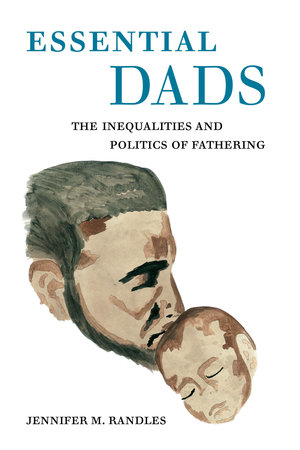by Jennifer Randles, author of Essential Dads: The Inequalities and Politics of Fathering
Only if I’m dead or in jail. These were the reasons the fathers I talked to said they would not be there for their children. In the wake of the police killing of George Floyd in 2020, these words would come to having a haunting resonance. Floyd, a 46-year-old Black man, died unconscious and pinned to the ground by three officers less than 20 minutes after a convenience store clerk called 911 on the suspicion that Floyd used a $20 counterfeit bill. What happened to Floyd could have happened to any one of the 64 low-income fathers of color who shared their stories with me for my new book, Essential Dads: The Inequalities and Politics of Fathering.
The book explores “responsible” fatherhood policies and programs intended to teach men about the importance of fathers, and to help them become economically self-sufficient and current on child support payments. An in-depth study of one program I call “DADS” revealed how class, race, and gender inequalities intersect to undermine marginalized men’s abilities to stay involved in their children’s lives, despite their best intentions. Just like George Floyd.
George Floyd was a father of three. The youngest, Gianna, was just six years old when her father was killed. Originally from Houston, Floyd moved to Minnesota for better job opportunities so that he could provide more for his children. When I learned of Floyd and his near-death calls for “Momma,” I immediately thought of one DADS participant I call Keegan. A Black father of three just like Floyd, Keegan joined DADS because he wanted “my kids knowing that I’m coming back at night.” He grew up fearing separation from his own father due to neighborhood violence and his fathers’ incarceration, and forged a particularly close relationship with his mother. Keegan is among the one in nine Black children in the United States who grow up with a parent in prison. He was committed to preventing his own children from becoming part of that same statistic.
In the context of racialized deep poverty, police targeting of men of color, and a higher likelihood of ending up in jail than with a job while lacking a high school diploma, what do political efforts to promote “responsible” paternal involvement really mean?
Keegan encountered a dilemma when his infant son needed both formula and diapers, and he and the baby’s mother could not come up with money for both. Writing a couple of hot checks for diapers led to a three-month stint in jail for Keegan. He explained: “It wasn’t a good decision, but it was the right one. My baby needed milk and Pampers.” Keegan was arrested in front of his infant son. Keegan vowed never to go through that again, even if it meant having to borrow money and owe someone.
Many other Black and Brown fathers told me about the risks they took every day to “be there” and provide and care for their children. Several pointedly told me that I would never understand what it was like to walk through the world in their skin, deemed “deadbeat” dads even when they were just trying to do right by their kids.
They were right. In the context of racialized deep poverty, police targeting of men of color, and a higher likelihood of ending up in jail than with a job while lacking a high school diploma, what do political efforts to promote “responsible” paternal involvement really mean? How easily Keegan and his classmates could have ended up pinned to the pavement, under an officer’s knee, with their children fearing that their fathers weren’t coming home that night.
Writing a couple of hot checks for diapers led to a three-month stint in jail for Keegan. He explained: “It wasn’t a good decision, but it was the right one. My baby needed milk and Pampers.”
Programs like DADS help by giving fathers chances to finish school, work, and learn about their worth to children. As importantly, Keegan and his classmates told me that DADS was a rare space where staff, teachers, and other fathers recognized them foremost as devoted dadsdoing all they could to provide more for their kids.
We should acknowledge all the men who could have been George Floyd, the over five million marginalized fathers in the United States who strive each day to be there for their children. We must recognize that, when it comes to “responsible” fatherhood, we all have a collective responsibility to promote fair policing and equitable opportunities. We are all responsible for ensuring that racial justice means fathers of color no longer fear the ultimate separation from their children and that children know their dads are coming home at night.

